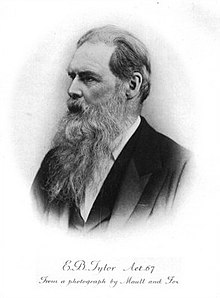Edward Burnett Tylor
| Sir Edward Burnett Tylor | |
|---|---|

Edward Burnett Tylor
|
|
| Born | 2 October 1832 Camberwell, London, England |
| Died | 2 January 1917 (aged 84) Wellington, Somerset, England, United Kingdom |
| Citizenship | British |
| Nationality | English |
| Fields | Anthropology |
| Institutions | University of Oxford |
| Known for | Cultural evolutionism |
Sir Edward Burnett Tylor (2 October 1832 – 2 January 1917) was an English anthropologist, the founder of cultural anthropology.
Tylor is representative of cultural evolutionism. In his works Primitive Culture and Anthropology, he defined the context of the scientific study of anthropology, based on the evolutionary theories of Charles Lyell. He believed that there was a functional basis for the development of society and religion, which he determined was universal. Tylor maintained that all societies passed through three basic stages of development: from savagery, through barbarism to civilization. Tylor is considered by many to be a founding figure of the science of social anthropology, and his scholarly works helped to build the discipline of anthropology in the nineteenth century. He believed that "research into the history and prehistory of man... could be used as a basis for the reform of British society."
Tylor reintroduced the term animism (faith in the individual soul or anima of all things, and natural manifestations) into common use. He considered animism to be the first phase of development of religions.
He was born in 1832, in Camberwell, London, and was the son of Joseph Tylor and Harriet Skipper, part of a family of wealthy Quakers who owned a London brass factory. His elder brother, Alfred Tylor, became a geologist.
He was educated at Grove House School, Tottenham, but due to the deaths of Tylor's parents during his early adulthood he never gained a university degree. After his parents' deaths, he prepared to help manage the family business, but had to set this plan aside when he developed symptoms consistent with the onset of tuberculosis (TB). Following advice to spend time in warmer climes, Tylor left England in 1855, travelling to Mexico. The experience proved to be an important and formative one, sparking his lifelong interest in studying unfamiliar cultures.
...
Wikipedia
